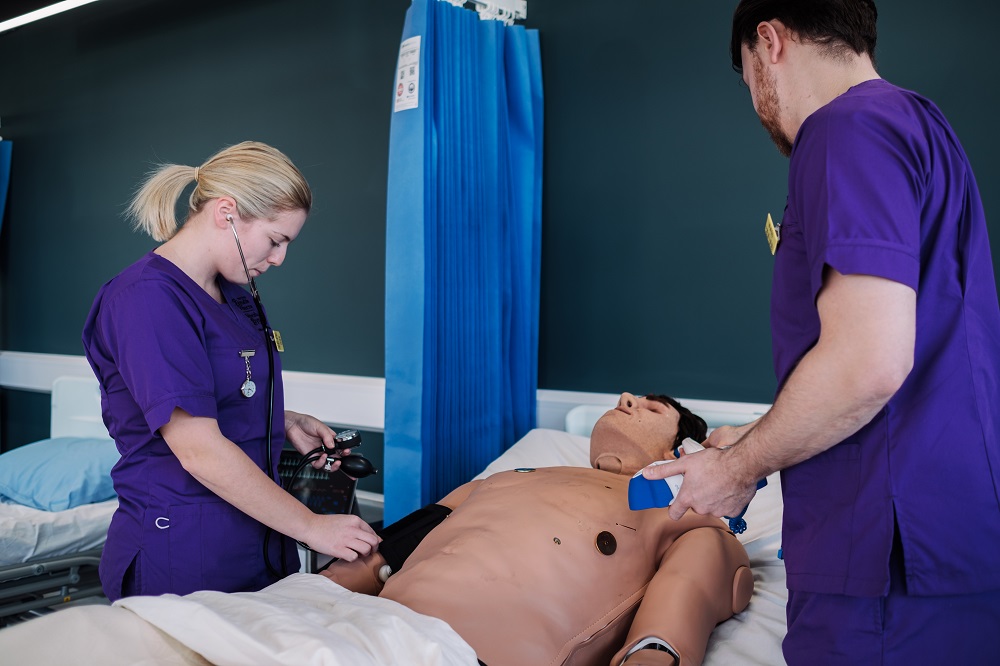Adult Nursing, Children’s Nursing and Mental Health Nursing: What are the differences?

So, you’re thinking about studying a Nursing degree at university, but may not be quite sure of which course to choose.
To help you make your decision, we have outlined the key differences between the different strands of Nursing we offer, and the information you’ll need to know before embarking on your learning journey with Wrexham University.
Adult, Children’s, and Mental Health Nursing, all have their own unique elements. They allow you to expand on your specific interests in healthcare, whilst also helping to prepare you for your chosen profession after university.
Adult Nursing
As a practicing adult nurse, you’ll be looking after a variety of patients within the adult age range. You will focus on the fundamental care skills required to practice as a caring, kind, compassionate professional, who values and respects the individual needs of the patient, family and carers.
During your Adult Nursing degree, you will learn about the provision of evidence-based safe care, for acute and chronically ill patients. You will coordinate and manage change, enhance people’s health outcomes, and take part in personal and professional development to prepare you for becoming a registered nurse.
Your placements will mean that you have a range of employment opportunities working as a staff nurse in the NHS and the private sector, in both acute and community settings. On successful completion of the course, you will be registered with The Nursing and Midwifery Council (NMC) as a registered adult nurse.
Evaluation includes a portfolio of proficiency outcomes, whilst a range of theoretical assessments are used in each year of the course. These include essays, presentations, case studies, drug calculation, and an anatomy and physiology exam.
Mental Health Nursing
The focus is slightly different with the Mental Health Nursing degree, as you will be supporting patients with mental ill health - this compares to the more generalised method of caring for physical ailments found in adult nursing. This contrary approach to nursing will help you connect with service users and their families by using a therapeutic process. You will also be working with patients in all age ranges, compared to the specialised age brackets of adult and children’s nursing.
The focus will be on law and ethics, with an emphasis on the holistic components of acute, diverse and long-term mental health conditions, as well as research, and evidence-based care. You’ll learn how to manage change and empower service users and family/carers, using applied bioscience for complex care.
Careers in mental health nursing include opportunities to work for a range of NHS organisations, such as hospitals, communities, specialist services, forensic mental health services and primary care. There is also an option to go into private sector organisation specialisations to include forensic mental health and nursing home care, as well as specialist drug and alcohol services.
During your Mental Health Nursing degree, you will be assessed through a variety of methods, including a practice assessment, clinical portfolio, written assignments, presentations and examinations.
Something to note is that registered mental health nurses, can expect a period of preceptorship, to transition from a student nurse to registered practitioner (this will be arranged by your employer).
Children’s Nursing
In contrast to Adult Nursing, a Children’s Nursing degree will help you provide family-centred care by equipping you with the skills to build positive relationships with young people and children specifically. You will support and guide families, along with working as part of a team of health and social care professionals.
You will focus on child-centred care, as well as expanding on research skills in this area. A key part of this strand of nursing, is empowering children, along with their family or carers through your role as a Child Nurse.
You will be assessed by a variety of methods similar to that of the Adult Nursing degree, including a practice assessment, clinical portfolio, written assignments, presentations, and examinations.
This qualification opens many doors and enables you to develop your career in a variety of organisational settings. These could be in children's hospitals, general hospitals, independent sector settings, community settings or in children's own homes.
Similarities and key information for all our Nursing courses
An NHS bursary, including tuition fees and a non-repayable bursary for living costs, is available for each of the Nursing courses. This funding option is available to you providing you agree to work in Wales for two years after registration (subject to change).
All three of the Nursing degrees incorporate placements as part of the learning, and you will be required to complete a certain amount of placement hours before graduating.
You have the opportunity to study any of the three strands at our main Wrexham campus, or at our St Asaph campus.
Wrexham hosts our healthcare simulation centre, where you will be able to experience real-life scenarios and gain practical experience before your placements.
St Asaph is a dedicated nursing centre of excellence with smaller class sizes and a collection of the same equipment as on our main campus.
Our teaching teams on both campuses pride themselves on supporting the local community, as well as curating a welcoming and dynamic student community for you to join.
Either campus is close to their respective city hospitals, although your placements may be in other locations.
You are supported throughout your studies by your lecturers and your placement practitioners. Additionally, you can access extra student support via the University’s support services to enhance your learning skills and make sure that your wellbeing is taken care of. Make sure to check out our undergraduate course pages for more about our Nursing degrees, see how you can start your learning journey and be part of Wrexham University!